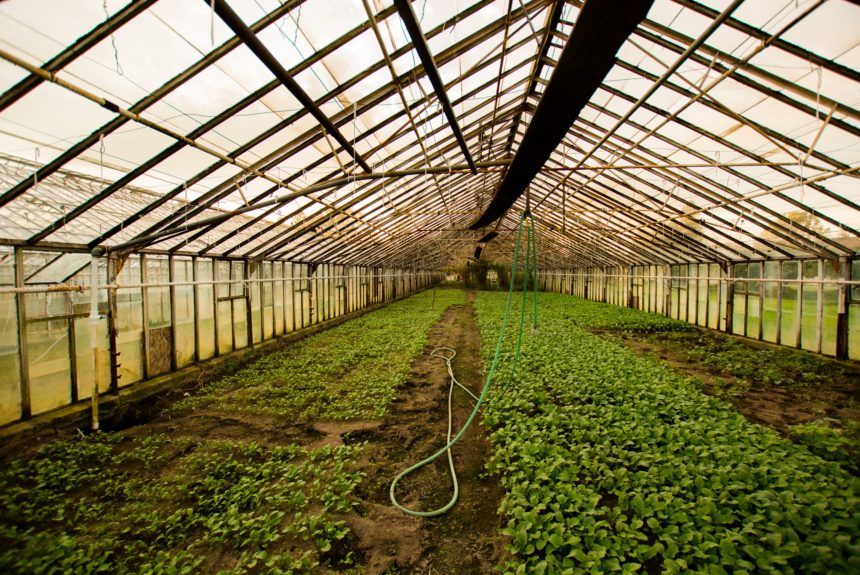The world must produce 56% more food by 2050 to meet global population demand, according to a 2019 World Resources Report from the United Nations. With over three-fourths of the world’s freshwater already set aside to agriculture, water scarcity will be the foremost threat to our global food systems.
That’s where AppHarvest comes in, the indoor farming operation launched by Jonathan Webb that uses 90% less water than traditional open-field farms. The company’s controlled-environment agriculture facilities run on just a handful of inputs, most of them naturally sourced.
>>>Meet Marrone Bio Innovations: Pioneer in Bio-Based Pest Solutions
The company’s flagship facility is a 60-acre greenhouse farm located in Morehead, KY that specializes in growing premium beefsteak tomatoes and tomatoes on the vine. The 2.8-million-square-foot structure, built during the Covid-19 pandemic, uses zero chemical pesticides and delivers 30 times more yield per acre than your typical outdoor farm. The facility is powered by 100% recycled rainwater and natural sunlight.
“I’m a huge believer that nature is the most technologically advanced thing we have on Planet Earth, and we need to harness it,” Webb says.
The Morehead greenhouse is the first of twelve planned high-tech indoor farms in eastern Kentucky. The facilities adhere to a unique horizontal “hydroponic” design that minimizes energy consumption and maximizes efficiency. Fresh rainwater is collected in the sprawling roof and stored in a ten-acre retention pond (think seventy Olympic-sized swimming pools). The water is then treated with sand and UV light for decontamination purposes. From there, water is delivered to the crops in precise amounts via drip irrigation, with any excess being re-filtered and reused. Plants are continuously monitored for adequate nutrient and water levels with the help of three hundred “strategically placed” microclimate-detecting sensors. Compared to conventional agriculture techniques, the highly controlled process accelerates production thirty-fold, the company claims.
Crops are harvested year-round, thanks to AppHarvest’s hybrid lighting system. During the day, sunlight reaches the tomatoes via the facility’s diffused-glass roof. At night or during the cooler winter months, natural solar is supplemented with sophisticated LEDs and high-pressure sodium growing lights that keep the greenhouse’s 720,000-plus crops developing. No soil is necessary to grow the plants; instead, a unique combination of natural pollinators and select nutrients catalyze the growing process.
The most prolific natural pollinators in the facility are bees. Five hundred beehives, each bearing up to 125 bees and their queen, pollinate sixty-eight bays and 684 rows of tomatoes during a short three-day window. The tomatoes must be fertilized via “buzz pollination,” a special type of pollination in which bees vibrate their bodies to remove and collect pollen from the flowers.
In addition to using natural pollinators, AppHarvest practices what’s known as “integrated pest management” (IPM), or the process of using beneficial insects combined with sophisticated machine learning technology to control pests and pathogens.
The IPM process is two-fold. AI imaging that allows for real-time analysis of crops is used to identify pests before they become an issue. Pests are also managed by biological controls (i.e. other “good pests”). The nature-based solution allows for harmful pests like the common indoor whitefly to be eliminated organically–that is, without the use of chemical pesticides.
Webb plans to extrapolate this technology to other crops in the near future, such as bell peppers, strawberries, and leafy greens. In an interview over the summer with Motley Fool’s Industry Focus, the founder praised “controlled-environment agriculture” as the third wave of sustainable infrastructure, following renewable energy and electric cars.
“The industry is at an inflection point. If you look at the largest grocers in the U.S., we’re selling to Kroger, Walmart, Publix, and we’re selling to Wendy’s. We’re in that classic scenario of demand exceeding supply,” he says.
The facilities are within a day’s drive of 70% of the U.S. population, which means products can be delivered fresh to grocers across the country. In addition to reducing transportation emissions by up to 80%, Webb is hedging on long-term consumer preferences for healthier, cleaner food.
“Consumers don’t want the harsh chemical pesticides,” he says. “We’ve built a model that gets us to profitability while competing with dirty agriculture products that are being shipped, you know, [two thousand miles] and two weeks on a truck.”
A recent USDA study on cherry tomatoes found 90% of tomatoes on grocery store shelves contained at least one harmful pesticide. Even more alarmingly, over one in three tomatoes contained traces of five or more harsh chemicals. Webb’s company offers an affordable alternative to the chemical-laden products being shipped from abroad.
“It’s a premium product at conventional pricing,” the 36-year-old CEO says.
Most produce in store shelves currently originates from Mexico or California. Unfortunately, shifting weather patterns due to climate change have left those places stricken with droughts and wildfires, hampering production and depleting critical water resources. In turn, Kentucky has experienced some of its wettest years on record, rendering the region ideal for fruit and vegetable growing.
“We’re really in the business of packaging up water and then shipping that out to major markets,” Webb claims, referring to the fact that fruits and veggies are 95% water.
Even so, there are downsides to the project, like the fact that building some of the world’s largest indoor farms releases a lot of greenhouse gas emissions in itself. Additionally, nighttime lighting, no matter how efficient, also consumes vast amounts of energy.
Nevertheless, the region’s record rainfall, combined with its prime geographic location and accessibility to major U.S. markets, has positioned Central Appalachia at the forefront of the budding agritech industry.
“Everybody watch out for Central Appalachia. We are absolutely going to be one of the largest fruit and vegetable suppliers in the U.S. in the decades to come,” he says.
Nathalie Voit is a freelance content creator and a graduate of the University of Florida. She is an alumni of The Heritage Foundation’s Young Leaders Program.
The views and opinions expressed are those of the author’s and do not necessarily reflect the official policy or position of C3.
